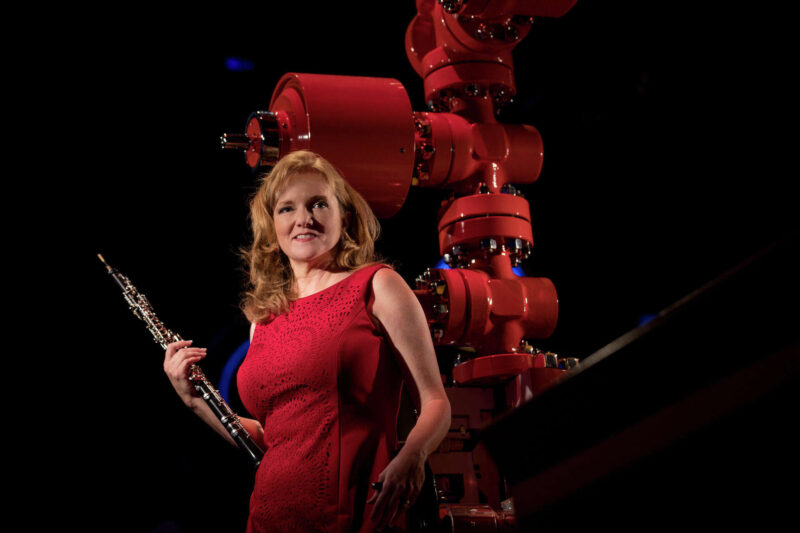
Photo by Jon Shapley
ROCO founder Alecia Lawyer has been lauded for her use of technology and unexpected spaces like Buffalo Bayou Park and Saint Arnold’s Brewing to showcase classical music
Source: This Houstonian you might not know is now one of Texas’ official state musicians
The Texas Commission on the Arts recently announced the Texas State Legislature’s 2025 appointment to the position of State Musician-Classical, which was awarded to one familiar face in Houston’s creative scene: Alecia Lawyer. She is the founder, artistic director and principal oboist of ROCO, a professional music ensemble that has been a trailblazer and arts disrupter who is leading in the sector in innovation.
Lawyer has been nominated in the past and even been a finalist when there was only one category: Texas State Musician of the Year. To put that in perspective, the Texas State Artists have been recognized since 1971. Yet, when the organization divided the category into two divisions — nonclassical and classical — it was only a matter of time before Lawyer’s name would be called. In fact, it only took one try as this is the inaugural year for the classical category.
Recalling her years as a nominee and her limelight as a finalist while it was still a single category, she notes that she lost to Willie Nelson — which she didn’t mind. Lawyer said she included that close-but-no-cigar loss to the singer-songwriter in her biography for years.
“There’s so much going on here that the commission felt it needed to make a separate distinction for classical,” she said. “I hope it shines a light on the possibilities of innovation, start-ups, the possibilities of entrepreneurialism in our field and that there is a wide-open pathway. There’s a huge playground out there for connecting all of our world with music. Your language of music might be a certain genre, but it also just might be the tie that binds, because to me, that is what music is. Today, music is the depth of the groanings of the spirit that you sometimes just cannot express in words.”
Her nonclassical counterpart this year is none other than country powerhouse Miranda Lambert, which makes Lawyer think of an unlikely shift in the paradigm happening right now with the commission.
“I feel like it’s the first time where classical is the one that’s being held up [rather than] anything that is on the [more popular] side,” she said. “It is so funny to me. Usually, it is the other way around. [Classical is] relegated to not being broadcast for the Grammys on television. We’re kind of the side act. So, I really am deeply grateful that the commission is lifting up artists of all genres because I believe in a genre-less world.”
Music is genetic
Lawyer, who originally wanted to study physics when she was younger, could not resist the call to music. After all, it is in her DNA. Her father was a band director, and her mother was a choir director and piano teacher.
“My first language was music, hands down,” she said. “I was singing before I could speak. I would play in my dad’s band, try every instrument and find my voice.”
She found her voice in the arts, which took her to study at Southern Methodist University and The Julliard School. As she entered her post-schooling career, she formed ROCO, formerly known as River Oaks Chamber Orchestra.
The 40-piece orchestra just wrapped its 20th season and is known for remaining on the cutting edge of how classical music is created and experienced. ROCO frequently works with musicians and guest artists from around the globe, and is also known for its world premieres, which stands at a whopping 150 and counting.
Lawyer, and by proxy ROCO, champions accessibility in the performing arts field and advocates for a human-first approach to all arts experiences.
She believes music brings “the connection and the accessibility and the relighting of a pilot light in adults. I don’t care if you don’t know what an oboe is. In fact, I have a picture of an oboe in my phone so I can show people if they don’t know what it is.”
She also believes there is a large misconception that people must know the finer details about classical music before they can come to discover it — a barrier she has worked hard to break down.
ROCO reimagines concert spaces and boldly incorporates programs to engage multi-generational audiences in fresh and meaningful ways. For their upcoming season, they will bring music to the people by performing in venues like Artechouse for the season opener, Saint Arnold’s Brewing Company for the annual “Beer and Brass” concert and Houston Public Library’s Julia Ideson Library to celebrate its 100th anniversary.
ROCO has also placed QR codes in various spots around town such as Buffalo Bayou, Hermann Park and Houston Botanic Garden, so people can scan it, and music will play that is site specific.
ROCO has also posted all of its performances to hear, online and free. Because of this, ROCO’s music is easily accessible around the globe.
Reflecting on her time in the performing arts, she describes her work as “wildcatting in the arts,” boldly drilling new wells of possibility in the traditionally rigid field of classical music. Now, she has a new title to show for the progress she and ROCO have made.

Leave A Reply